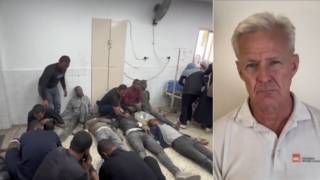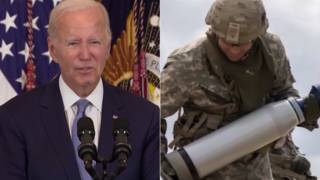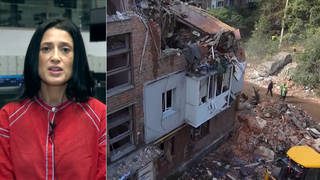
Related
Guests
- Stephen Crowleyprofessor of politics at Oberlin College, where he is the chair of Russian, East European and Eurasian studies.
- Medea Benjaminco-founder of CodePink.
It has been two years since Russia invaded Ukraine, sparking a brutal war in which tens of thousands of soldiers and civilians have died. With Ukraine running low on both weapons and new recruits, and with more U.S. funding stalled in Congress, we host a discussion on the future of the conflict with peace activist Medea Benjamin of CodePink and Oberlin professor Stephen Crowley, an expert on Russian and Eastern European politics. While both agree on the need to end the war, Crowley says the $60 billion U.S. funding package should be passed in order to give Ukraine a stronger negotiating position. “The only reason to fund Ukraine right now is to get both sides to the negotiating table to end this war,” he says. Benjamin, however, says more funding will inevitably be used to continue the fighting. “It will only give the impetus for Zelensky to keep trying to fight a war that is not winnable,” she says, adding that progressives are making a mistake to cede the antiwar position to “the extreme right of the Republican Party.”
Transcript
AMY GOODMAN: We begin today’s show looking at the war in Ukraine. Saturday marked two years since Russian forces invaded Ukraine. This month also marks 10 years since Russia moved to seize Crimea from Ukraine after mass protests forced the ouster of Ukraine’s pro-Russian President Viktor Yanukovych. Russia has long accused the United States of orchestrating a coup in Ukraine in 2014.
Leaders from many European nations gathered in Paris Monday and pledged to send more arms to Ukraine, including medium- and long-range missiles. French President Emmanuel Macron said he cannot rule out sending ground troops to Ukraine to fight Russian forces.
PRESIDENT EMMANUEL MACRON: [translated] Everything was discussed in a free and direct manner tonight. There was no consensus today to send troops onto the ground in a manner that’s official, assumed and endorsed. But on the dynamic, nothing should be excluded. We will do everything so that Russia cannot win this war.
AMY GOODMAN: The second anniversary of the war comes amidst an intense debate in Washington over U.S. funding for Ukraine. Earlier this month, the Senate approved a $95 billion foreign aid package that includes $60 billion in military aid for Ukraine. Republican House Speaker Mike Johnson has refused to schedule a vote on the funding. President Biden is hosting Johnson and other congressional leaders at the White House today to press for the military aid package that also includes $14 billion for Israel. Biden is also attempting to avert a partial government shutdown Friday.
In an interview on CNN, Ukrainian President Volodymyr Zelensky claimed millions of people could die if U.S. lawmakers don’t approve the funding. Zelensky was interviewed by CNN’s Kaitlan Collins.
KAITLAN COLLINS: Senator JD Vance, who was in Munich at the security conference but didn’t meet with you, he said that even if you got the $60 billion in aid, it is not going to fundamentally change the reality on the battlefield. What’s your response to that?
PRESIDENT VOLODYMYR ZELENSKY: I’m not sure that he understands what’s going on here. And we don’t need any rhetoric from people who are not deeply in the — you know, in the war. So, to understand it, he should come to the frontline to see what’s going on, to speak with the people, then to go to civilians to understand what will be with them and then what will be with them without this support, and he will understand that millions of people been killed — will be killed.
KAITLAN COLLINS: So, he doesn’t understand it?
PRESIDENT VOLODYMYR ZELENSKY: Because he doesn’t understand it. Of course he doesn’t. God bless, you don’t have the war on your territory.
AMY GOODMAN: The debate over U.S. funding for Ukraine comes as more details emerge about how the CIA has played a critical role assisting Ukraine on the battlefield. The New York Times has revealed the CIA helped build a network of 12 secret spy bases along the Russian border over the past eight years. The Times reports the CIA has also trained elite Ukrainian commando forces and a new generation of Ukrainian spies. Just last week, CIA Director William Burns made a secret trip to Ukraine, his 10th visit since Russia’s invasion two years ago.
To talk more about the war in Ukraine and U.S. funding, we’re joined by two guests. Medea Benjamin, co-founder of CodePink, co-author of the book War in Ukraine: Making Sense of a Senseless Conflict, her new piece for The Progressive is headlined “After Two Years of War in Ukraine, It’s Time for Peace.” She’s joining us from Miami. And in Cleveland, Ohio, we’re joined by Stephen Crowley. He’s a professor of politics at Oberlin College, where he’s the chair of Russian, East European and Eurasian studies. His latest book is titled Putin’s Labor Dilemma: Russian Politics Between Stability and Stagnation. His latest piece for the Responsible Statecraft is headlined “Pass Ukraine aid, but make it conditional on ending the war.”
Professor Crowley, let’s begin with you. Explain what you are proposing.
STEPHEN CROWLEY: Hi, Amy. Good to hear from you. Good to be part of this.
So, yeah, I think the one reason to fund Ukraine is to bring the war to an end. To my mind, that’s the only reason. This war has gone on for two years. Even though we’re in the 21st century — we have drones and satellites and precision missiles — it’s essentially descended into trench warfare that looks very much like World War I. Many people continue to die on both sides, and yet the lines barely move at all. And yet we hear pundits and political leaders talking about the possibility of a long war. 2014 might be bad for Ukraine, but 2015 might somehow miraculously be better. This, to my mind, just seems like magical thinking. I think the only reason to fund Ukraine right now is to get both sides to the negotiating table to end this war.
JUAN GONZÁLEZ: And, Medea Benjamin, what about this issue of providing more weapons to end the war?
MEDEA BENJAMIN: Well, with all due respect to Stephen, I just don’t understand it at all. I mean, you give more money precisely for the war to keep going. And let’s remember the package that is being proposed now in the House, as you said in the introduction, it’s not just $60 billion for Ukraine. It’s also $14 billion for Israel as part of that. It also says no money can be going to the relief agency UNRWA. And it also has billions of dollars for Taiwan and the Indo-Pacific to antagonize China. This package should be fiercely opposed by progressives all over the country, because it will only continue the war in Ukraine, as well as continue other wars on other continents. This is exactly what the world doesn’t need, what the American public doesn’t need. It’s a terrible bill and must be opposed.
JUAN GONZÁLEZ: And, Professor Crowley, I wanted to ask you about this New York Times piece that came out on Sunday about the CIA’s long involvement in training elite troops that were — some of them were conducting sabotage and assassinations during the period not after the Russian invasion, but before the Russian invasion, during the war in Donbas. And so it’s clear that the CIA was involved back through about 2014 and 2015 on the ground in Ukraine. Does that reshape the way we look at — because, surely, Putin must have known that. He must have known about the CIA involvement on the ground in Ukraine. Does that shed new light on the reasons why Putin decided to invade?
STEPHEN CROWLEY: I think it might, Juan. If you look closely at that New York Times article, they sort of briefly brush past the — a couple of sentences where they said that Russia was aware of this and saw this as rather provocative, that perhaps the United States was intending to, perhaps, act aggressively or even, you know, invade Russia. And they just sort of then said, “Of course, that’s not true, so we don’t really need to consider that any further.” But we have grievously failed to consider the other side, to look at things from the Russian perspective. And it’s very easy to demonize Putin. He does a very good job of making that quite possible. His policies are really quite vile. But we have made a mistake in understanding the provocative nature, going back to NATO expansion, as your readers and listeners will be well aware of, and this happened for years. This predated Putin being in power.
And unfortunately, this is — this sort of mentality is continuing, and if we don’t recognize the dangers, the provocations that led to this conflict, this war, even though this was Putin’s decision to invade, but, nevertheless, there is another side to this — if we don’t learn that lesson, we’re going to slow walk into another war, I’m afraid, between the United States and China over Taiwan, because we’re still thinking in terms of deterrence — we have to be strong to deter the other side — and we neglect the fact that this can create insecurity on the other side, that just leads to build-up, escalation, and eventually to violence and war.
AMY GOODMAN: Professor Stephen Crowley, your piece is headlined “Pass Ukraine aid, but make it conditional on ending the war.” And I wanted to ask both you and Medea Benjamin this part of it: How do you make it conditional on that? What would negotiations look like? What would bring both sides to the table? And do you think there are secret talks going on right now?
STEPHEN CROWLEY: I do not know whether there are talks going on right now, but there absolutely should be. And I’m afraid there’s been lots of hints that — well, there’s been speculation. People have said, “Well, Putin doesn’t want to negotiate,” or they’ve said, “He says he wants to negotiate, but he really is just doing this to deter the West from supplying, giving any support to Ukraine.”
And my answer to that is, well, test that. Let’s call it. Let’s say we’re ready to negotiate. Like, we, yes, including — we can’t simply leave this to the Ukrainians. It’s understandable that their country was invaded. They want to do everything they can to repel the invader. But it’s on us, the people that are sending rockets and military materiel there, to remind the Ukrainians, “Look, this isn’t going to get any better for you. It could only get worse. And now is the time to negotiate.”
And if Putin isn’t willing to negotiate, then call him on that. Then just say, “Yes, this is on him now.” But I think there are many signs of war fatigue in Russia as well as Ukraine. They’re more hidden behind the repressive atmosphere and the propaganda and so forth, but Russia itself is also tiring of war.
AMY GOODMAN: And, Medea Benjamin, if you could respond to that? What would a negotiation look like? And what would bring both sides to the table?
MEDEA BENJAMIN: Well, it’s tragic, because we know exactly what a negotiation would look like, because it was happening four days after the Russian invasion. There had been a series of talks going on for the entire month, and they came up with a 15-point plan, which was, in essence, that Russia would — that Ukraine would not join NATO, that Ukraine would be a neutral country, in exchange for guarantees by other countries. The Ukrainians had even agreed at that time to put the issue of Crimea off well into the future. They talked about a 15-year consultation on the status of Crimea. The essence of what peace talks would be are already very clear.
And let’s also be clear that it is the U.S. and the U.K. that sabotaged those early peace talks. They said to Ukraine that “Putin is a war criminal, should not be negotiated with, and if you come up with a deal, we will not back it.” We have also seen in these two years all these attempts by countries around the world, whether it is China or Mexico or Brazil or the six African nations, that have come forward with peace plans that the U.S. has just dismissed. So we have to recognize that the U.S., as the secretary of defense had said, wants to use this as an opportunity to weaken Russia.
And so, pouring more money into this conflict is just going to mean more Ukrainians going to be killed, more conscripted Russian soldiers going to be killed. We have to seize this moment right now, not give more money, and say this is the time to go to the negotiating table. In fact, Ukraine is in a worse position now than it was a year ago, when the chief of staff of the U.S., Milley, said, “Seize the moment,” and the U.S. did not do it. And imagine if Donald Trump is the next president. This will be even worse for Ukraine. So now is the time to seize the moment and go to negotiations, stop fueling a war that is not winnable on the battlefield.
JUAN GONZÁLEZ: And, Medea, I wanted to ask you: What would you respond to those who say that allowing Russia and Putin to maintain control of portions of Ukrainian territory will only embolden him to pursue more aggression throughout Europe?
MEDEA BENJAMIN: Well, if indeed Putin’s aim was to take over Ukraine, he hasn’t been able to do that. In that sense, Russia has already lost. And he is not going to be able to go any further than maintaining the hold of the territories in the Donbas that he controls now. And Crimea is recognized as a territory that had been part of Russia for about 200 years, where the majority of people are ethnic Russians and Russian-speaking. So, I think if Ukraine did not become part of NATO, made it clear that it would be a neutral country, this could be perceived by Putin as a win, and it could also be perceived by the Ukrainians as a win that Putin was not able to take over any more of their country and that there would be some kind of fast track for Ukraine to be entering the European Union. There are certainly things that can be negotiated that could be put to the people of Russia and Ukraine as a way to get out of this, as Stephen said, war weariness on both sides.
While Zelensky is saying that he desperately needs more weapons, his general — secretary of defense has said that half of the weapons promised by the West and allocated have not even been delivered. And what we know as perhaps the most difficult problem for Ukraine is one of manpower. They don’t have the recruits. The most gung ho nationalist fighters have already been killed or maimed, and the new recruits are very hard for them to find. They say they need another 500,000 recruits. Well, they just fired all the recruiters recently because of corruption. People were paying $12,000 to be smuggled out of the country. They don’t have the manpower. And let’s recognize that Russia has over three times the population of Ukraine. This is not a good situation for Ukraine. And if we pour more money in, it will only give the impetus for Zelensky to keep trying to fight a war that is not winnable.
JUAN GONZÁLEZ: Professor Crowley, I wanted to ask you about this whole issue of increased military aid in a situation where there’s considerable evidence not only of corruption within the Ukrainian government, but of massive amounts of weapons that were already allocated have been delinquent or missing, according to an Associated Press report recently.
STEPHEN CROWLEY: You know, Juan, I’m not totally up to speed on that, but I would say the answer for Ukraine isn’t really more weapons. It is really to get both sides to the negotiating table. I think the package might give Ukraine enough leverage to be able to sit down with Russia, that appears, at least at the moment, to have a stronger hand, but to bring an end to it. And the funding ultimately needs to go to reconstructing Ukraine. There’s been some estimates of $1 trillion that it will cost to reconstruct Ukraine after this devastation.
And onto your earlier question, the earlier question to Medea, Russia may look like it’s coming out of this war as a victor if things end right now, but the long-term prospects for Russia are quite grim. Its economy is overheating. It’s isolated from the rest of the world, outside of places like Iran and North Korea. China is not a true partner. Russia needs China more than China needs Russia. So, the talk coming out of places like Europe, that, well, if the war ends, then in five or 10 years Putin is somehow going to amass enough forces to attack Estonia, let alone Poland, it seems to me just ludicrous. He may — even if he wanted to do that, I don’t see how that is possible.
And there’s talk, unfortunately, in Europe about shifting resources from areas like climate change to increasing more military weapons and more military production. And unfortunately, that’s exactly what Putin would like to have, because the way he fuels his war is through the sale of oil and gas. And if the world, Europe in particular, can shift to greater climate change alleviation, less dependence on oil and gas, then this would even weaken Russia’s position even further.
AMY GOODMAN: White House national security adviser Jake Sullivan said Sunday Ukraine needs more military aid. He was speaking to Martha Raddatz on ABC’s This Week.
JAKE SULLIVAN: This is not about a shortage of oil, Martha. This is about a shortage of bullets. And if we can fill that shortage of bullets, Ukraine will stand up brave and courageous and take the fight to the Russians. … The United States will continue alongside our allies and partners to try to get Ukraine all of the tools and capabilities that it needs to be able to conduct this fight as rapidly and as efficiently as we possibly can.
AMY GOODMAN: So, Medea Benjamin, if you can respond to this and also the fact that the House speaker, Johnson, has not put this on the floor of the House for a vote — it passed the Senate — because, it’s believed, it would pass overwhelmingly, interestingly enough, from the Republicans and the Democrats? I’m wondering your thoughts on where political lines are these days.
MEDEA BENJAMIN: Well, the political lines are extremely strange. There are no Democrats who are opposing more money to Ukraine. You might remember, Amy, way back last year in October when there were 30 progressive Democrats who said, “Maybe it’s time to consider negotiations,” and they were so pilloried by their own party, they had to withdraw that letter within 24 hours, and, for the most part, have been absolutely silent ever since. I think this is tragic.
This is leaving it to the extreme right of the Republican Party to take a position that is very popular with the American people. Very early on in this war, an AP poll showed that the majority of Americans thought the U.S. should only play a minor role in the case of Ukraine. And it is not popular to be sending tens and tens of billions of dollars to Ukraine, when President — when candidate Trump says that he would end this war in a day by calling up his two friends, Zelensky and Putin, and that Biden is not capable of ending this war. That is something that is very popular, not among only Trump supporters, but the general public. The public does not want to keep funding this war. Schumer just came back from Ukraine and said that it would take years to win this war. And that implies the American public should keep spending what has now been over $100 billion on this war? I don’t think that’s a very popular position, and I think it’s very bad for Biden, if he doesn’t come out.
And as Stephen said, he should try talking to Putin. You asked if there had been attempts or behind-the-scenes talks. Well, we just saw from Reuters, by a senior Moscow correspondent, that, indeed, the Russians had reached out to the U.S., as late as January of this year, asking for talks. And Jake Sullivan and others responded that they could talk to Russia about other issues, but not about Ukraine. I say the Democrats better start talking to Russia, better start pushing Ukraine to the negotiating table, because it is not a popular position.
JUAN GONZÁLEZ: And, Medea, we just have about less than a minute for this segment, but I’m wondering the other war, the Israeli war on Gaza, and the position of progressives and Democrats in Congress on that, on funding — on additional funding for Israel. Your take on that?
MEDEA BENJAMIN: Yes. Unfortunately, because of the way that this package has been packaged, they have thrown money in for Ukraine, which Democrats support, and they have put money in for humanitarian aid, although it can’t go to UNRWA. And so, there are Democrats, even Democrats that have called for a ceasefire, that we fear will vote for this package, because they’ll say, “Oh, well, we had to vote for it for the money for Ukraine.” We saw that in the Senate. The very few senators — there are only six of them — who have called for a ceasefire, four of them voted for the package, because, they said, “Oh, we have to vote for the money for Ukraine.” That’s an excuse for them. I think we have to go to all the members of Congress and say, “Not one penny for Israel. Even if it’s in a package that you like something else in there, no more money for Israel. Oppose the entire package.”
AMY GOODMAN: Medea Benjamin, co-founder of CodePink, her recent piece for The Progressive headlined “After Two Years of War in Ukraine, It’s Time for Peace.” And Stephen Crowley, professor of politics at Oberlin College, speaking to us from Cleveland, his latest piece in Responsible Statecraft is headlined “Pass Ukraine aid, but make it conditional on ending the war.”
When we come back, we’ll be joined by the legendary consumer advocate and four-time presidential candidate Ralph Nader. He turns 90 today. Stay with us.
[break]
AMY GOODMAN: “Happy Birthday” by Stevie Wonder. And this is, today, a birthday, for our next guest, Ralph Nader.













Media Options